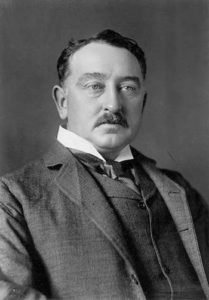
Cecil Rhodes
*Cecil Rhodes was born on this date in 1853. He was a white-British mining magnate and a South African politician.
The son of a priest, Cecil John Rhodes, was born at Netteswell House, Bishop's Stortford, Hertfordshire. He was a sickly child. He was sent to South Africa by his family when he was 17 years old in the hope that the climate might improve his health. He entered the diamond trade in Kimberley in 1871, at the age of 18, and over the next two decades, he gained near-complete domination of the global diamond market. His De Beers diamond company, formed in 1888, remains prominent into the 21st century.
Rhodes entered the Cape Parliament at 27 in 1880 and, a decade later, became Prime Minister. One of Rhodes's primary motivations in politics and business was his professed belief that the Anglo-Saxon race was, as he wrote in a 1877 letter, "the first race in the world." Under the reasoning that "the more of the world we inhabit, the better it is for the human race." Rhodes wanted to expand the British Empire because he believed the Anglo-Saxon race was destined for greatness. In his last will, Rhodes said of the English, "I contend that we are the first race in the world and that the more of the world we inhabit, the better it is for the human race. I contend that every acre added to our territory means the birth of more of the English race who otherwise would not be brought into existence."
He wanted to develop an American elite of philosopher-kings who would lead the United States in rejoining the British Empire. Rhodes also respected and admired the Germans and their Kaiser; he allowed German students to be included in the Rhodes scholarships. He believed that the United Kingdom (including Ireland), the US, and Germany would eventually dominate the world and ensure perpetual peace. Rhodes's views on race have been debated; he supported the rights of Black Africans to vote, but critics have labeled him as an "architect of apartheid" and a "white supremacist," particularly since 2015.
According to some, Rhodes was "unhappy that in many Cape Constituencies, Africans could be decisive if more of them exercised this right to vote under current law (referring to the Cape Qualified Franchise)," with Rhodes arguing that "the native is to be treated as a child and denied the franchise. We must adopt a system of despotism, such as works in India, in our relations with the barbarism of South Africa".
Rhodes advocated the governance of indigenous Africans living in the Cape Colony "in a state of barbarism and communal tenure" as "a subject race. I do not go so far as the member for Victoria West, who would not give the black man a vote. ... If the whites maintain their position as the supreme race, the day may come when we shall be thankful that we have the natives with us in their proper position." However, historian Raymond C. Mensing notes, "Rhodes was not a biological or maximal racist. Despite his support for what became the basis for the apartheid system, he is best seen as a cultural or minimal racist". Rhodes advocated for greater self-government in the Cape Colony, which aligned with his preference for an empire governed by local settlers and politicians rather than London.
While critical of Rhodes, scholar and white Zimbabwean author Peter Godwin writes that he needs to be viewed via the prisms and cultural and social perspective of his era, positing that Rhodes "was no 19th-century Hitler. He wasn't so much a freak as a man of his time...Rhodes and the white pioneers in southern Africa did behave despicably by today's standards, but no worse than the white settlers in North America, South America, and Australia, and in some senses better, considering that the genocide of natives in Africa was less complete. For all the former African colonies are now ruled by indigenous peoples, unlike the Americas and the Antipodes, most of whose aboriginal natives were all but exterminated."
Rhodes never married; historians such as Robin Brown have suggested that Rhodes was a homosexual who was in love with his private secretary, Neville Pickering. Rhodes was Prime Minister of the Cape Colony from 1890 to 1896. An ardent believer in British imperialism, Rhodes and his British South Africa Company invaded the southern African territory of Rhodesia (now Zimbabwe and Zambia), which the company named after him in 1895. South Africa's Rhodes University is also named after him. After overseeing the formation of Rhodesia during the early 1890s, he was forced to resign as Prime Minister in 1896 following the disastrous Jameson Raid, an unauthorized attack on Paul Kruger's South African Republic (also known as the Transvaal). His career never recovered. Rhodes established the provisions of the Rhodes Scholarship, which his estate funded. He also put much effort into his vision of a Cape to Cairo Railway through British territory.
As part of his legacy, on his death (March 26, 1902), Rhodes left a significant amount of money to be used to finance talented young scholars ("race" was not a criterion) at Oxford, the Rhodes Scholarship. Currently, in Oxford, some South African and Zimbabwean recipients of funds from his legacy are campaigning for his statue to be removed from display in Oxford. When asked if there was any double standard or hypocrisy in being funded by the Rhodes Scholarship fund and benefiting from the opportunity while simultaneously campaigning against the legacy of Rhodes, one of the South African campaigners, Ntokozo Qwabe, replied. That "this scholarship does not buy our silence...There is no hypocrisy in receiving a Rhodes scholarship and being publicly critical of Cecil Rhodes and his legacy... No clause binds us to find 'the good' in Rhodes’ character, nor to sanitize the imperialist, colonial agenda he propagated." In June 2020, the governing body of Oxford's Oriel College voted to remove the statue of Rhodes.